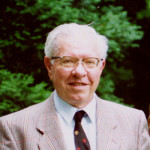
Sir Fred Hoyle
Once upon a time, some of the smartest people in the world thought the universe might have always existed in its current state, hence the name steady state theory was given to the idea of an eternal universe that has always existed in more or less its current form.
Aristotle. Bertrand Russell. Sir Fred Hoyle.
These men were certainly not stupid. In fact, they were among the most brilliant intellectuals of their respective eras.
Coincidentally, all three of these men were atheists. They believed our allegedly “fine-tuned” universe was eternal in part because there was insufficient scientific evidence, at least in their minds, for them to believe otherwise. But they also believed the universe had always existed as it currently is because of the implications created by the alternative, a fine-tuned universe that once had a beginning.
Hoyle famously said,
Some super-calculating intellect must have designed the properties of the carbon atom; otherwise the chance of my finding such an atom through the blind forces of nature would be utterly minuscule. A common sense interpretation of the facts suggests that a super-intellect has monkeyed with physics, as well as with chemistry and biology, and that there are no blind forces worth speaking about in nature. The numbers one calculates from the facts seem to me so overwhelming as to put this conclusion almost beyond question.
Clearly, the idea of an eternal universe has more appeal than the idea of a fine-tuned universe produced from absolute nothingness, possibly because it is less complex.
Fred Hoyle stubbornly refused to believe in that super-intellect he mentioned despite the growing evidence that supported the Big Bang theory and advocated steady state theory until his death, presumably because he couldn’t conceive of an entity that much smarter than him.
However, after Edwin Hubble discovered redshift, and Penzias and Wilson won a Nobel Prize in physics for their work on the cosmic microwave background (CMB), the Big Bang theory seemed to have settled the debate over a universe with a beginning versus an eternal universe.
If we assume the universe had the origin all the scientific evidence now suggests, then our focus should turn to a different question — was the creation of the universe an accident, or did it happen on purpose? Also, the exquisitely timed period of inflation that immediately followed the Big Bang…was that also due to unintelligent good luck?
Extrapolating further, if the creation of the universe was an accident, how do we explain the origin of life — another fortunate accident?
Is it possible to create a universe from nothing without the help of a Creator? Can DNA and a living cell be the result of nothing more than a lucky chemical reaction?
Exactly how much serendipity is required for the human race to exist?
Suffice it to say that the probability problems created by the Big Bang alone led to the development of multiverse theory, and the problems caused by abiogenesis gave us panspermia theory — meaning literally, sperm from outer space.
My contemplation of these probability and other existential problems led to my development of what I call my “Big Picture” argument, described in detail in my book Counterargument for God.
Honesty compels me to admit that I’ve been trying to focus my full attention on writing novels, fairly confident that there won’t be any scientific breakthroughs in the meantime that might shake up my current worldview enough to require me to revise it.
But when my friend Shane asked my opinion on this article titled “No Big Bang? Quantum equation predicts universe has no beginning,” of course I had to read the article in order to form an opinion.
My initial reaction is to suggest to my friend that he reread the article again, this time more carefully, and note how it asserts some sort of quantum calculation might have solved the mystery of the Big Bang by eliminating the beginning of the universe by making “corrections” to existing theory. To remove the need for an invisible God, these two theoretical scientists proposed a universe filled with an invisible quantum fluid composed of hypothetical particles called gravitons.
My friend should pay closer attention to all of the conditional verbs that were used in a few short paragraphs vaguely describing a theory promising great potential: how many times the article claims the new math “may” or “could” mean something — it is mostly speculation for a specific purpose, which is to eliminate a need for a God to properly answer an existential question.
The article asserts that “the Big Bang singularity arises directly and unavoidably from the mathematics of general relativity” before offering the problems with the Big Bang “can be resolved by this new model in which the universe has no beginning, and no end.”
What the author really seems to be saying is “just trust us.”
The article doesn’t explain is how the scientific evidence of redshift and the cosmic microwave background radiation fit with this new theory. That evidence is universally accepted, and if this new theory can’t explain it, then it will be practically useless.
According to the author, the laws of physics “break down” at the moment of the Big Bang and thus fail to properly explain that singular event, or what could have come before the Big Bang. However, it has been my experience that the best way to solve a problem is not to simply pretend it doesn’t exist.
All of the available scientific evidence indicates the universe is expanding from a point in time that occurred billions of years ago.
These new “corrections” to the existing theory do not promise to solve the mystery of why the universe appears to have been fine-tuned uniquely to support life, or why inflation was necessary immediately following the Big Bang. It doesn’t solve the mystery of abiogenesis, or explain how descent via sexual reproduction alone might account for the millions of diverse forms of life on earth.
This “new” theory appears to be nothing but another effort to fix a problem with the existing theory that describes the creation of this universe without invoking a Creator, if for no other reason, because that seems to be an unwritten rule among modern scientists.
In short, the alleged new information promised by the article was virtually useless. The time of those involved would have been better spent seeking to understand quantum consciousness.
My advice to Shane is simple: don’t worry about articles with wild speculation and audacious claims like these until the Big Bang theory becomes obsolete, and the scientists proposing these theories have won virtually universal acceptance from the physics community — and a Nobel Prize, of course.

Speak Your Mind